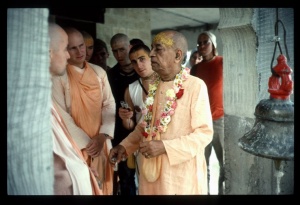SB 4.8.58: Difference between revisions
m (1 revision(s)) |
No edit summary |
||
| Line 1: | Line 1: | ||
{{info | {{info | ||
|speaker= | |speaker=Nārada Muni | ||
|listener=King Dhruva | |listener=King Dhruva | ||
}} | }} | ||
[[Category:Srimad-Bhagavatam - Canto 04 Chapter 08]] | |||
[[Category:Bhagavatam Verses Spoken by Narada Muni - Vanisource|040858]] | |||
<div style="float:left">'''[[Srimad-Bhagavatam]] - [[SB 4|Fourth Canto]] - [[SB 4.8: Dhruva Maharaja Leaves Home for the Forest|Chapter 8: Dhruva Mahārāja Leaves Home for the Forest]]'''</div> | |||
<div style="float:right">[[File:Go-previous.png|link=SB 4.8.57]] '''[[SB 4.8.57]] - [[SB 4.8.59-60]]''' [[File:Go-next.png|link=SB 4.8.59-60]]</div> | |||
{{RandomImage}} | |||
==== TEXT 58 ==== | ==== TEXT 58 ==== | ||
<div | <div class="verse"> | ||
paricaryā bhagavato | :paricaryā bhagavato | ||
yāvatyaḥ pūrva-sevitāḥ | :yāvatyaḥ pūrva-sevitāḥ | ||
tā mantra-hṛdayenaiva | :tā mantra-hṛdayenaiva | ||
prayuñjyān mantra-mūrtaye | :prayuñjyān mantra-mūrtaye | ||
</div> | </div> | ||
| Line 16: | Line 22: | ||
==== SYNONYMS ==== | ==== SYNONYMS ==== | ||
<div | <div class="synonyms"> | ||
''paricaryāḥ''—service; ''bhagavataḥ''—of the Personality of Godhead; ''yāvatyaḥ''—as they are prescribed (as above mentioned); ''pūrva-sevitāḥ''—recommended or done by previous ācāryas; ''tāḥ''—that; ''mantra''—hymns; ''hṛdayena''—within the heart; ''eva''—certainly; ''prayuñjyāt''—one should worship; ''mantra-mūrtaye''—who is nondifferent from the mantra. | |||
</div> | </div> | ||
| Line 23: | Line 29: | ||
==== TRANSLATION ==== | ==== TRANSLATION ==== | ||
<div | <div class="translation"> | ||
One should follow in the footsteps of previous devotees regarding how to worship the Supreme Lord with the prescribed paraphernalia, or one should offer worship within the heart by reciting the mantra to the Personality of Godhead, who is nondifferent from the mantra. | One should follow in the footsteps of previous devotees regarding how to worship the Supreme Lord with the prescribed paraphernalia, or one should offer worship within the heart by reciting the mantra to the Personality of Godhead, who is nondifferent from the mantra. | ||
</div> | </div> | ||
| Line 30: | Line 36: | ||
==== PURPORT ==== | ==== PURPORT ==== | ||
<div | <div class="purport"> | ||
It is recommended here that even if one cannot arrange to worship the forms of the Lord with all recommended paraphernalia, one can simply think about the form of the Lord and mentally offer everything recommended in the śāstras, including flowers, candana pulp, conchshell, umbrella, fan and cāmara. One can meditate upon offering and chant the twelve-syllable mantra, oṁ namo bhagavate vāsudevāya. Since the mantra and the Supreme Personality of Godhead are nondifferent, one can worship the form of the Lord with the mantra in the absence of physical paraphernalia. The story of the brāhmaṇa who worshiped the Lord within his mind, as related in Bhakti-rasāmṛta-sindhu, or The Nectar of Devotion, should be consulted in this connection. If paraphernalia is not present physically, one can think of the items and offer them to the Deity by chanting the mantra. Such are the liberal and potent facilities in the process of devotional service. | It is recommended here that even if one cannot arrange to worship the forms of the Lord with all recommended paraphernalia, one can simply think about the form of the Lord and mentally offer everything recommended in the ''śāstras'', including flowers, ''candana'' pulp, conchshell, umbrella, fan and ''cāmara''. One can meditate upon offering and chant the twelve-syllable ''mantra'', ''oṁ namo bhagavate vāsudevāya''. Since the ''mantra'' and the Supreme Personality of Godhead are nondifferent, one can worship the form of the Lord with the ''mantra'' in the absence of physical paraphernalia. The story of the ''brāhmaṇa'' who worshiped the Lord within his mind, as related in ''Bhakti-rasāmṛta-sindhu'', or ''The Nectar of Devotion,'' should be consulted in this connection. If paraphernalia is not present physically, one can think of the items and offer them to the Deity by chanting the ''mantra''. Such are the liberal and potent facilities in the process of devotional service. | ||
</div> | </div> | ||
__NOTOC__ | |||
<div style="float:right; clear:both;">[[File:Go-previous.png|link=SB 4.8.57]] '''[[SB 4.8.57]] - [[SB 4.8.59-60]]''' [[File:Go-next.png|link=SB 4.8.59-60]]</div> | |||
__NOTOC__ | |||
__NOEDITSECTION__ | |||
Revision as of 17:38, 10 May 2021

A.C. Bhaktivedanta Swami Prabhupada
TEXT 58
- paricaryā bhagavato
- yāvatyaḥ pūrva-sevitāḥ
- tā mantra-hṛdayenaiva
- prayuñjyān mantra-mūrtaye
SYNONYMS
paricaryāḥ—service; bhagavataḥ—of the Personality of Godhead; yāvatyaḥ—as they are prescribed (as above mentioned); pūrva-sevitāḥ—recommended or done by previous ācāryas; tāḥ—that; mantra—hymns; hṛdayena—within the heart; eva—certainly; prayuñjyāt—one should worship; mantra-mūrtaye—who is nondifferent from the mantra.
TRANSLATION
One should follow in the footsteps of previous devotees regarding how to worship the Supreme Lord with the prescribed paraphernalia, or one should offer worship within the heart by reciting the mantra to the Personality of Godhead, who is nondifferent from the mantra.
PURPORT
It is recommended here that even if one cannot arrange to worship the forms of the Lord with all recommended paraphernalia, one can simply think about the form of the Lord and mentally offer everything recommended in the śāstras, including flowers, candana pulp, conchshell, umbrella, fan and cāmara. One can meditate upon offering and chant the twelve-syllable mantra, oṁ namo bhagavate vāsudevāya. Since the mantra and the Supreme Personality of Godhead are nondifferent, one can worship the form of the Lord with the mantra in the absence of physical paraphernalia. The story of the brāhmaṇa who worshiped the Lord within his mind, as related in Bhakti-rasāmṛta-sindhu, or The Nectar of Devotion, should be consulted in this connection. If paraphernalia is not present physically, one can think of the items and offer them to the Deity by chanting the mantra. Such are the liberal and potent facilities in the process of devotional service.